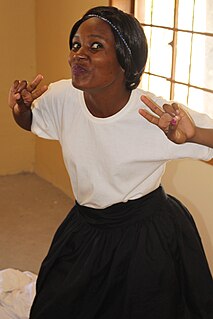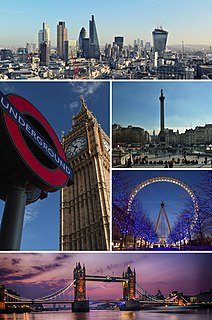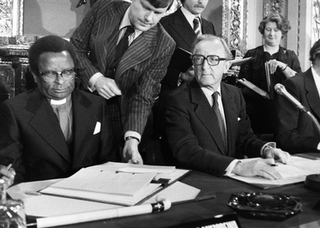Grey Mabhalani Bango (born Southern Rhodesia, now Zimbabwe),son of Luposwa Bango, was a trade-unionist and chief of the Kalanga people of Matopos. He is best known for guiding Joshua Nkomo, leader of the Zimbabwe African Peoples Union (ZAPU) through the shrines of the Matopos Hills (now Matobo National Park) during Nkomo’s legendary 1953 visit to Dula. [1]

The Colony of Southern Rhodesia was a self-governing British Crown colony in southern Africa. It was the predecessor state of what is now Zimbabwe.

Zimbabwe, officially the Republic of Zimbabwe, is a landlocked country located in southern Africa, between the Zambezi and Limpopo Rivers, bordered by South Africa, Botswana, Zambia and Mozambique. The capital and largest city is Harare and the second largest being Bulawayo. A country of roughly 16 million people, Zimbabwe has 16 official languages, with English, Shona, and Ndebele the most commonly used.

The Kalanga, or BakaLanga, are a southern Bantu ethnic group mainly inhabiting Matabeleland in Zimbabwe, with smaller numbers in northeastern Botswana, Gaza Province in Mozambique, and Limpopo Province in South Africa.
Joshua Nkomo wrote:
As the spirit of Zimbabwean nationalism came to the fore again in the early 1950s, I examined for myself the power of the traditional faith of my people and visited the shrine where Mwali resides in the Matopos Hills. Well before dawn, at about 3am, William Sivako and Grey Mabhalani Bango, the nephew of the chief of my father’s village, accompanied me to the place called Dula. [2]
According to legend, Nkomo heard a voice from the shrine addressing him and his guides by name, and asking them what they wanted.
Nkomo replied that he had come "to ask you to give this land back to your children, the people of the land." The voice replied: "Yes, my children. I will give you back your land. It will be after thirty years and it will be after a big war in which many will die... But you, son of Nyangolo, great-son of Maweme, you will lead this nation."... Narratives of Nkomo’s visit to Dula, which came to be widely distributed in Matabeleland, bestowed a sacred legitimacy on his leadership. [3]
Modern-day Matabeleland is a region in Zimbabwe divided into three provinces: Matabeleland North, Bulawayo and Matabeleland South. These provinces are in the west and south-west of Zimbabwe, between the Limpopo and Zambezi rivers. The region is named after its inhabitants, the Ndebele people. Other ethnic groups who inhabit parts of Matabeleland include the Tonga, Kalanga, Venda, Nambia, Sotho, Tswana and Khoisan. As of August 2012, according to the Zimbabwean national statistics agency ZIMSAT, the southern part of the region had 683,893 people, comprising 326,697 males and 356,926 females, with an average size household of 4.4 in an area of 54,172 square kilometres (20,916 sq mi). As for the Matabeleland Northern Province, it had a total population of 749,017 people out of the population of Zimbabwe of 13,061,239. The proportion of males and females was 48 and 52 percent respectively within an area of just over 75,017 square kilometres (28,964 sq mi). The remaining Bulawayo province had a population of 653,337 in an area of 1,706.8 square kilometres (659.0 sq mi). Thus the region has a combined population of 2,086,247 in an area of just over 130,000 square kilometres (50,000 sq mi) and that is just over the size of England. The major city is Bulawayo, other notable towns are Plumtree and Hwange. The land is particularly fertile but dry. This area has important gold deposits. Industries include gold and other mineral mines, and engineering. There has been a decline in the industries in this region as water is in short supply. Promises by the government to draw water for the region through the Matabeleland Zambezi Water Project have not been carried out. The region is allegedly marginalised by the government.
Grey Bango is the father of DJ, journalist and radio programmer Robert Dumakude Bango, who escaped the then unrecognised state of Rhodesia to London in 1974.

A journalist is a person who collects, writes, or distributes news or other current information to the public. A journalist's work is called journalism. A journalist can work with general issues or specialize in certain issues. However, most journalists tend to specialize, and by cooperating with other journalists, produce journals that span many topics. For example, a sports journalist covers news within the world of sports, but this journalist may be a part of a newspaper that covers many different topics.
Robert Dumakude Bango is a DJ, music journalist, and radio programmer. He is the son of Grey Mabhalani Bango, a trade-unionist and tribal chief who served as guide to Joshua Nkomo during his 1953 visit to the shrines of the Matopos Hills.

London is the capital and largest city of England and the United Kingdom. Standing on the River Thames in the south-east of England, at the head of its 50-mile (80 km) estuary leading to the North Sea, London has been a major settlement for two millennia. Londinium was founded by the Romans. The City of London, London's ancient core − an area of just 1.12 square miles (2.9 km2) and colloquially known as the Square Mile − retains boundaries that follow closely its medieval limits. The City of Westminster is also an Inner London borough holding city status. Greater London is governed by the Mayor of London and the London Assembly.












